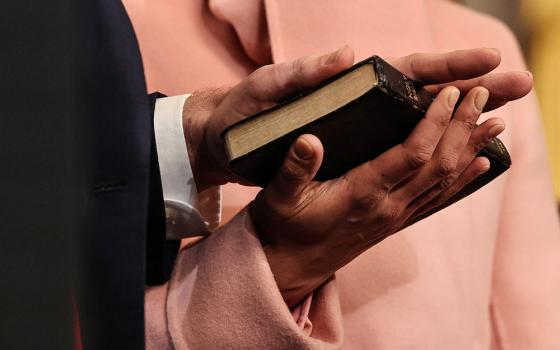
Dorothy Day (CNS/courtesy Milwaukee Journal)
Saying it was for the church to decide whether Dorothy Day was a saint, Los Angeles Archbishop Jose Gomez told a conference on the co-founder of the Catholic Worker Movement that she left a rich legacy for people to follow.
"I don't know if she is a saint ... but I do know she makes me want to be a saint. She makes us want to be better. She makes us want to be holy," Gomez said in remarks to the conference May 14.
Day has been named a servant of God by the church and the diocesan phase of the canonization process has been underway in the New York archdiocese since 2000.
The archbishop discussed the remarkable life and achievements of Day and her impact on the 20th century after she and Peter Maurin opened the Catholic Worker in a storefront in New York's Bowery in the midst of the Great Depression in 1933.
"She walked with the great saints of the church, like Francis of Assisi, John of the Cross, Catherine of Siena and many others," Gomez said, noting he was not authority on Day. "These were her constant companions. She once said she spent her days in conversation with Jesus and the saints of the church."
"I want to think and live like a saint," he said. "I believe that what she has left us is a saint's vision of our times and our society."
The archbishop's address was part of a three-day conference, "Dorothy Day and the Church: Past, Present and Future" and was one of several events marking the 125th anniversary of the University of St. Francis in Fort Wayne. The May 13-15 conference was co-sponsored by Our Sunday Visitor.
Day, a journalist, social activist and devout Catholic convert, became known for her social justice campaigns in defense of poor, hungry, homeless and marginalized people. The Catholic Worker Movement continues to combine direct aid for the poor and homeless with nonviolent direct action on their behalf. She served as editor of The Catholic Worker newspaper from 1933 until her death in 1980 at age 83.
Gomez said the journal of Day's life reads like a saint. Her reason for writing was to bring news to others of an inner war. In her newspaper articles and speeches she was writing the spiritual diary of the 20th century.
"Her conversion story is the story of a soul," the archbishop said. "It was Dorothy's experience of love and goodness that brought her to conversion. ... In the glory of childbirth, she came to see that God made us in His image. ... She wanted to show us ... the consequences of trying to live without God."
Gomez asked, "How do we continue to live as Christians in a society that has no room for Christ and for God? How do we live, work and raise our families? How do we carry out our mission?
"Dorothy Day gives us a powerful vision of how to live in a secularized society," he said.
Relating her life to today's world, Gomez suggested that "the greatest danger of our age, I believe, is secularism."
The early 21st century is a time when men and women must be messengers and disciples and practice heroic charity, he explained.
In order to live in this society, "the secularized society which we are, we need to strive to live in a close relationship with Jesus Christ," Gomez said.
The archbishop recalled a recent annual youth conference held in the Los Angeles archdiocese, where 16,000 young people attended separate Masses in two large groups. The theme of the liturgy was a rap song titled, "Talk Jesus With Me." He said the catchy phrase obviously involves talking to Jesus and Jesus talking back.
He pointed to Day's belief that all people are called by Jesus to care for those living on society's margins. He quoted Day, saying she believed there is always room for more saints.
"God expects something from each one of us that no one else can do," Gomez said. "Keep following Jesus. 'Talk Jesus With Me!' "
"I don't know if Dorothy Day is a saint," the archbishop repeated. "That's for the church to decide. But she left us a beautiful legacy."
[Vince LaBarbera writes for Today's Catholic, newspaper of the diocese of Fort Wayne-South Bend.]



